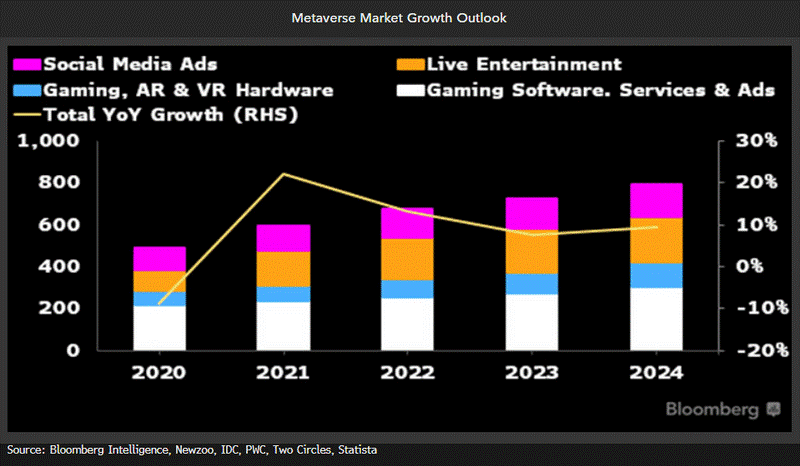

September 8, 2022
Virtual Healthcare Management in Metaverse
The use of metaverse in medical education and training is assistive in developing an augmented reality space to examine the physiology of a human body in a laboratory setting.
Owing to the technical upheavals and modern-day application of AI and robotics, the world is amidst revolutionary change. The digital health metaverse is expanding at a drastic rate and capturing other sectors as well. The healthcare industry is witnessing some great transformative patterns that can create avenues for the growth and ailment of diseases. Research predicts that metaverse will cater to 3 million online patients by the end of this year.
The metaverse, often known as the virtual environment, is a network of interconnected online areas where people may engage in activities such as gaming, shopping, and even attending events using virtual avatars. It is a synthesis of many technical terms such as VR, AR, MR, AI, and digital currency. There are many proofs of how AR/VR/MR technologies are enabling new approaches to healthcare, ranging from mental health to pain treatment, surgery, fitness, physical therapy, telemedicine, virtual patient care, etc. Because of new medical advancements, the healthcare technology business is continually developing. The healthcare industry is undergoing an enormous digital transition, from virtual scanning scans and X-rays to surgical care and virtual reality.
Metaverse & Mindfulness
The whole field of mental health therapy has been revolutionized. Mental health can be catered to by metaverse-based tech solving a variety of brain difficulties such as phobias, anxiety disorders, hallucinations, and other associated issues. During a mental breakdown, technology has revolutionized the way individuals seek help from family, colleagues, or healthcare physicians.
Meta-Education
The use of metaverse in medical education and training is assistive in developing an augmented reality space to examine the physiology of a human body in a laboratory setting. This technology has the ability to usher in a new era of education. This new atmosphere fosters cooperation, new experiences, the capacity to share and develop, and a high degree of immersion. The stated issues include invasions of privacy, students’ maladaptation in the real world, and criminal activities. Virtual reality is being used to train doctors and medical workers by replicating real-world surgeries and displaying human anatomy statistics. AR has now made its way into medical school courses and has had a positive influence on medicine.

Big tech firms like Meta and Microsoft have emphasized how the metaverse holds the potential to change the social setup globally. While it remains to be seen whether the metaverse develops, a few firms are currently utilizing some of the essential components that will eventually compose the metaverse, particularly the healthcare industry.
The most common kinds of augmented reality in healthcare include the usage of tools and specialized software to accomplish tasks such as surgery and for efficient diagnostics utilizing technology like smart glasses for transparency in the analysis of various diseases. Among the devices are head-mounted displays, portable devices, wearables, vision-based, and mobile-device-based devices.
Gamification Based Healthcare
As platforms such as Roblox have altered the perception of gamification, an increasing number of users are looking for opportunities to interact and engage with other users. Through such platforms, everyone may now fantasize, create, or have fun with pals. When it comes to medicine, gamification is mostly used in wellness and fitness apps. Augmented reality has been used in smarter exercises and virtual teacher guidance.
3D Avatars
In the Metaverse, 3D avatars of health workers will be able to interact with tools like digital whiteboards, and they will be able to meet face-to-face without the need for complicated conference equipment. Machines, systems, and processes will be tested safely using digital twins to discover flaws and vulnerabilities before being used in a real setting.
Surgical Tools Management In Metaverse
Immersive surgical experiences can provide real-time advice in the surgeon’s field of view. AR will provide access to information while keeping the operating area sterile, boosting pinpoint accuracy and flexibility. In the Metaverse, simultaneous teaching, learning, and organizing, as well as cooperative medical operations, will be feasible. When integrated with artificial intelligence, this has the potential to improve medical decisions and give more accurate medicines tailored to each individual patient.
Metaverse Ecosystem
Beyond Metaverse, there is one example of a future Healthcare Metaverse ecosystem. It intends to enhance education and training by utilizing a collaboration platform for concurrent education, training, and planning, as well as collaborative medical operations. As the digital health business is booming each day, collaborative programs for healthcare practice are gaining traction. The Metaverse will first be utilized for surgical simulations, diagnostic imaging, and patient care. The commercialization of health data will open up new business avenues. Millions of individuals might make a living by ‘playing to earn,’ ‘learning to earn, and moving to earn.’
Healthcare Management
With the help of data linkages with blockchain, data owners are expected to earn revenues and monetize their data. This will cater to their health data in the future thanks to self-sovereign identification of disease. And data-driven appropriate health care that can overtake traditional institutional models. Utilizing technology is expected to also provide customers with a better capacity to control their health and wellbeing and make better, more informed decisions.
A pool of opportunities awaits for individuals based on “learn to earn” which will be incorporated into healthcare. The Metaverse is expected to first be utilized for surgical simulations, diagnostic imaging, patient care management, rehabilitation, and health management. These tools are going to help patients learn more about their diseases or treatment strategies faster. Moreover, AR and VR can assist care teams at the point of care in a clinical setting. When integrated with radiology, AR can give physicians the capacity to project medical pictures. Such as CT scans, directly onto the patient and in alignment with the patient’s bodily requirements. Allowing clinicians to see interior anatomy more clearly. This has the potential to improve patient health via realistic consultations, individualized care, therapy, and diagnostics via data interconnectivity.
Thriving amidst the tech changes and modernization of the world. The metaverse is the new normal and is expected to transform healthcare in the future. With avenues for scalability, artificial intelligence is assisting healthcare for a better healthcare system.







